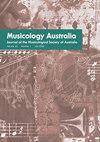Just Vibrations: The Purpose of Sounding Good
IF 0.3
0 MUSIC
引用次数: 4
Abstract
If it were not bad enough to find out that the Australian government has over recent years been redistributing Australian Research Council funds away from the humanities (and in particular the creative arts and writing) by a factor of almost two-thirds towards areas it described as being of ‘immediate and critical importance’, we now know that at least two music research projects that were approved in the 2019 grant round were subsequently denied support at the whim of former Federal education minister Simon Birmingham. I doubt many of us were surprised, however. The annual chore of grant writing has felt for some time now to be a Sisyphean one, more a ritual of disciplinary self-abasement rather than self-affirmation given the already dismally low chances of success. Nevertheless there now seems to be clear grounds for Australian Vice-Chancellors and learned academies to protest vigorously about such open prejudice against our discipline. Musicologists should protest too, of course, but perhaps we could also consider how we might better present the case for public support. To that end, the appearance of a book like William Cheng’s Just Vibrations: The Purpose of Sounding Good seems both timely and welcome, for in it Cheng sets himself the task of examining how musicology might ‘renegotiate the means and purposes of careful labor, intellectual inquiry, and living soundly’ (p. 5). Cheng’s endeavour parallels recent work done by a consortium of conservatoire heads (of which I was one) who explored how tertiary music education could be more explicitly understood in terms of its benefits to wider society. Just Vibrations stands out, however, for focusing specifically on musicology and has quickly generated a good deal of online只是振动:听起来不错的目的
如果发现澳大利亚政府近年来一直在将澳大利亚研究委员会的资金从人文学科(尤其是创意艺术和写作)中重新分配近三分之二,用于其所称的“直接和关键的重要”领域,我们现在知道,在前联邦教育部长西蒙·伯明翰的心血来潮下,至少有两个在2019年拨款中获得批准的音乐研究项目随后被拒绝支持。然而,我怀疑我们中的许多人是否感到惊讶。一段时间以来,每年的助学金写作都被认为是西西弗式的,更多的是一种纪律性的自卑仪式,而不是自我肯定,因为成功的几率已经低得令人沮丧。尽管如此,澳大利亚副校长和学术学院现在似乎有明确的理由强烈抗议这种对我们学科的公开偏见。当然,音乐学家也应该抗议,但也许我们也可以考虑如何更好地向公众提供支持。为此,像程的《Just Vibrations:the Purpose of Sounding Good》这样的书的出现似乎既及时又受欢迎,因为程在书中为自己设定了一项任务,即研究音乐学如何“重新协商谨慎劳动、智力探索和健康生活的手段和目的”(第5页)。程的努力与一个音乐学院院长联盟(我就是其中之一)最近所做的工作类似,该联盟探讨了如何更明确地理解高等音乐教育对更广泛社会的好处。然而,Just Vibrations因专注于音乐学而脱颖而出,并迅速在网上引起了大量关注
本文章由计算机程序翻译,如有差异,请以英文原文为准。
求助全文
约1分钟内获得全文
求助全文

 求助内容:
求助内容: 应助结果提醒方式:
应助结果提醒方式:


